Strengths and Weaknesses: Questionnaires in Nigerian Social Work
VerifiedAdded on 2022/10/12
|5
|1416
|345
Report
AI Summary
This report examines the use of questionnaires as a quantitative data collection method in social work, specifically focusing on the context of disability and neglect in Nigeria. It explores the strengths of questionnaires, such as the ability to gather information from a large population and simplify complex attitudes, alongside weaknesses, including potential language barriers and high costs. The research references a study by the Grass Roots Researchers Association (GRA) highlighting the vulnerability of people with disabilities, particularly women, in Nigeria. The paper discusses the application of social work principles to improve data collection and create positive relationships with respondents. It also addresses the challenges faced by disabled individuals, such as discrimination and lack of access to resources. The conclusion emphasizes the importance of social work skills and questionnaires in understanding and addressing the issues faced by people with disabilities in Nigeria. The report cites various academic sources, including the World Health Organization and other researchers.
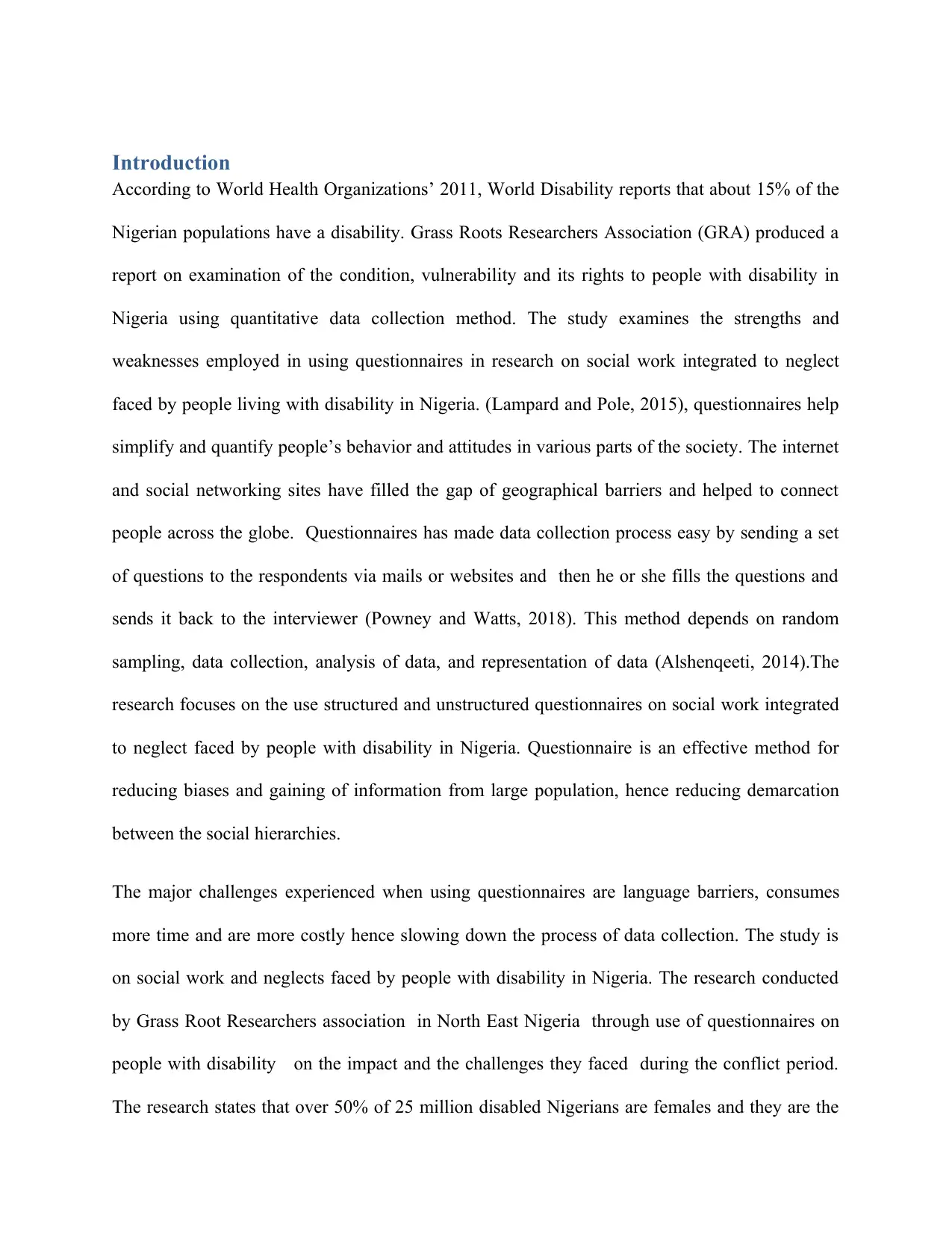
Introduction
According to World Health Organizations’ 2011, World Disability reports that about 15% of the
Nigerian populations have a disability. Grass Roots Researchers Association (GRA) produced a
report on examination of the condition, vulnerability and its rights to people with disability in
Nigeria using quantitative data collection method. The study examines the strengths and
weaknesses employed in using questionnaires in research on social work integrated to neglect
faced by people living with disability in Nigeria. (Lampard and Pole, 2015), questionnaires help
simplify and quantify people’s behavior and attitudes in various parts of the society. The internet
and social networking sites have filled the gap of geographical barriers and helped to connect
people across the globe. Questionnaires has made data collection process easy by sending a set
of questions to the respondents via mails or websites and then he or she fills the questions and
sends it back to the interviewer (Powney and Watts, 2018). This method depends on random
sampling, data collection, analysis of data, and representation of data (Alshenqeeti, 2014).The
research focuses on the use structured and unstructured questionnaires on social work integrated
to neglect faced by people with disability in Nigeria. Questionnaire is an effective method for
reducing biases and gaining of information from large population, hence reducing demarcation
between the social hierarchies.
The major challenges experienced when using questionnaires are language barriers, consumes
more time and are more costly hence slowing down the process of data collection. The study is
on social work and neglects faced by people with disability in Nigeria. The research conducted
by Grass Root Researchers association in North East Nigeria through use of questionnaires on
people with disability on the impact and the challenges they faced during the conflict period.
The research states that over 50% of 25 million disabled Nigerians are females and they are the
According to World Health Organizations’ 2011, World Disability reports that about 15% of the
Nigerian populations have a disability. Grass Roots Researchers Association (GRA) produced a
report on examination of the condition, vulnerability and its rights to people with disability in
Nigeria using quantitative data collection method. The study examines the strengths and
weaknesses employed in using questionnaires in research on social work integrated to neglect
faced by people living with disability in Nigeria. (Lampard and Pole, 2015), questionnaires help
simplify and quantify people’s behavior and attitudes in various parts of the society. The internet
and social networking sites have filled the gap of geographical barriers and helped to connect
people across the globe. Questionnaires has made data collection process easy by sending a set
of questions to the respondents via mails or websites and then he or she fills the questions and
sends it back to the interviewer (Powney and Watts, 2018). This method depends on random
sampling, data collection, analysis of data, and representation of data (Alshenqeeti, 2014).The
research focuses on the use structured and unstructured questionnaires on social work integrated
to neglect faced by people with disability in Nigeria. Questionnaire is an effective method for
reducing biases and gaining of information from large population, hence reducing demarcation
between the social hierarchies.
The major challenges experienced when using questionnaires are language barriers, consumes
more time and are more costly hence slowing down the process of data collection. The study is
on social work and neglects faced by people with disability in Nigeria. The research conducted
by Grass Root Researchers association in North East Nigeria through use of questionnaires on
people with disability on the impact and the challenges they faced during the conflict period.
The research states that over 50% of 25 million disabled Nigerians are females and they are the
Paraphrase This Document
Need a fresh take? Get an instant paraphrase of this document with our AI Paraphraser
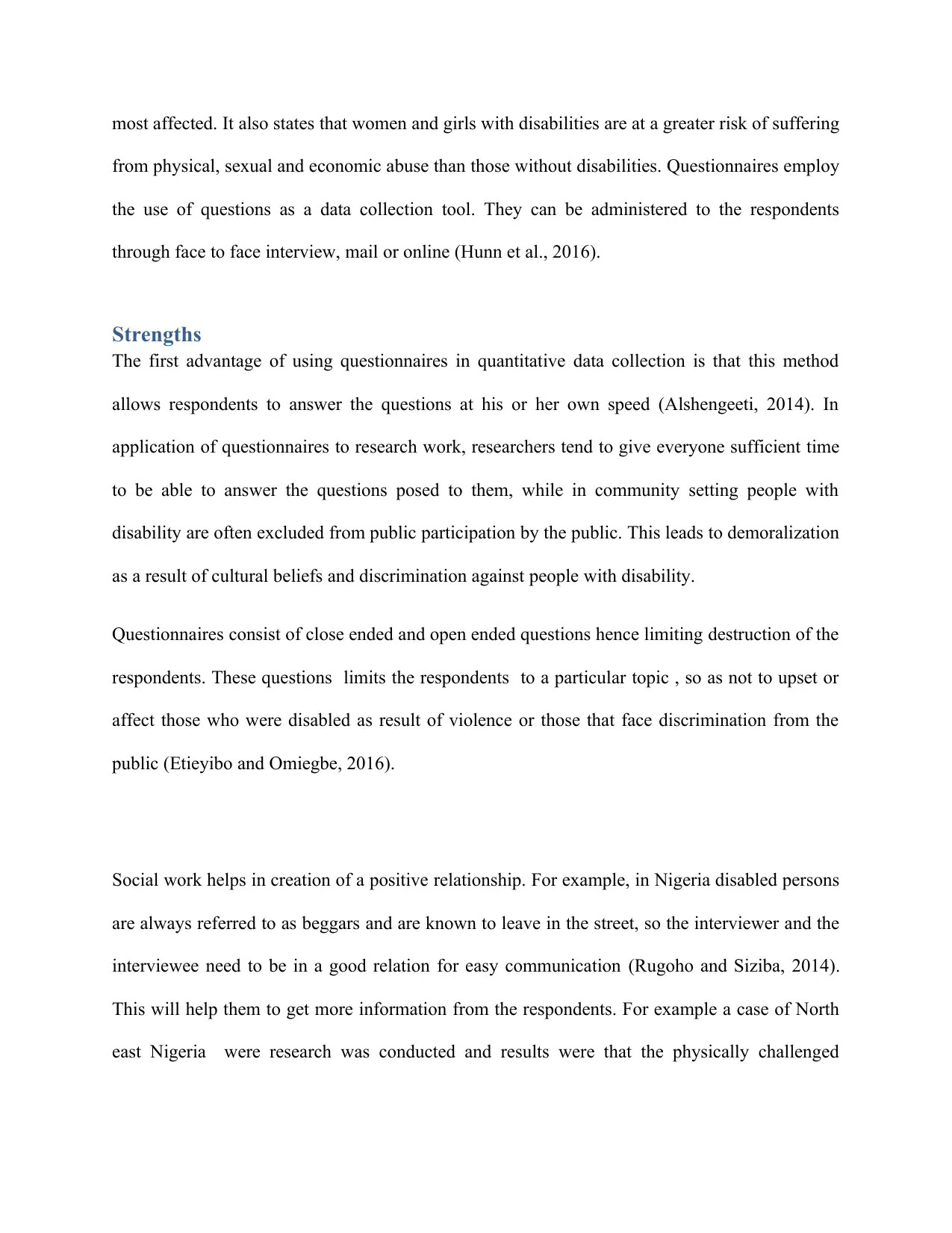
most affected. It also states that women and girls with disabilities are at a greater risk of suffering
from physical, sexual and economic abuse than those without disabilities. Questionnaires employ
the use of questions as a data collection tool. They can be administered to the respondents
through face to face interview, mail or online (Hunn et al., 2016).
Strengths
The first advantage of using questionnaires in quantitative data collection is that this method
allows respondents to answer the questions at his or her own speed (Alshengeeti, 2014). In
application of questionnaires to research work, researchers tend to give everyone sufficient time
to be able to answer the questions posed to them, while in community setting people with
disability are often excluded from public participation by the public. This leads to demoralization
as a result of cultural beliefs and discrimination against people with disability.
Questionnaires consist of close ended and open ended questions hence limiting destruction of the
respondents. These questions limits the respondents to a particular topic , so as not to upset or
affect those who were disabled as result of violence or those that face discrimination from the
public (Etieyibo and Omiegbe, 2016).
Social work helps in creation of a positive relationship. For example, in Nigeria disabled persons
are always referred to as beggars and are known to leave in the street, so the interviewer and the
interviewee need to be in a good relation for easy communication (Rugoho and Siziba, 2014).
This will help them to get more information from the respondents. For example a case of North
east Nigeria were research was conducted and results were that the physically challenged
from physical, sexual and economic abuse than those without disabilities. Questionnaires employ
the use of questions as a data collection tool. They can be administered to the respondents
through face to face interview, mail or online (Hunn et al., 2016).
Strengths
The first advantage of using questionnaires in quantitative data collection is that this method
allows respondents to answer the questions at his or her own speed (Alshengeeti, 2014). In
application of questionnaires to research work, researchers tend to give everyone sufficient time
to be able to answer the questions posed to them, while in community setting people with
disability are often excluded from public participation by the public. This leads to demoralization
as a result of cultural beliefs and discrimination against people with disability.
Questionnaires consist of close ended and open ended questions hence limiting destruction of the
respondents. These questions limits the respondents to a particular topic , so as not to upset or
affect those who were disabled as result of violence or those that face discrimination from the
public (Etieyibo and Omiegbe, 2016).
Social work helps in creation of a positive relationship. For example, in Nigeria disabled persons
are always referred to as beggars and are known to leave in the street, so the interviewer and the
interviewee need to be in a good relation for easy communication (Rugoho and Siziba, 2014).
This will help them to get more information from the respondents. For example a case of North
east Nigeria were research was conducted and results were that the physically challenged
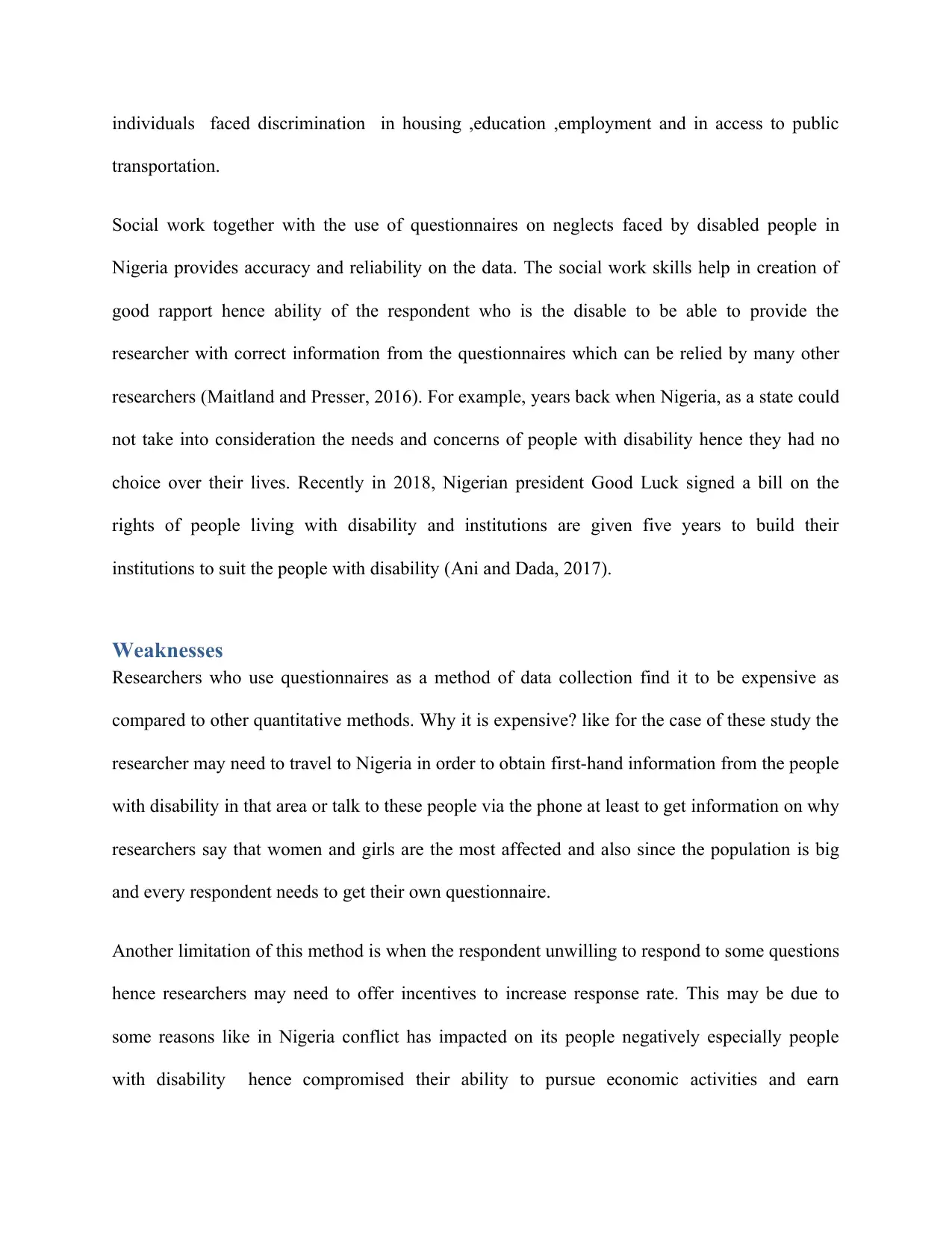
individuals faced discrimination in housing ,education ,employment and in access to public
transportation.
Social work together with the use of questionnaires on neglects faced by disabled people in
Nigeria provides accuracy and reliability on the data. The social work skills help in creation of
good rapport hence ability of the respondent who is the disable to be able to provide the
researcher with correct information from the questionnaires which can be relied by many other
researchers (Maitland and Presser, 2016). For example, years back when Nigeria, as a state could
not take into consideration the needs and concerns of people with disability hence they had no
choice over their lives. Recently in 2018, Nigerian president Good Luck signed a bill on the
rights of people living with disability and institutions are given five years to build their
institutions to suit the people with disability (Ani and Dada, 2017).
Weaknesses
Researchers who use questionnaires as a method of data collection find it to be expensive as
compared to other quantitative methods. Why it is expensive? like for the case of these study the
researcher may need to travel to Nigeria in order to obtain first-hand information from the people
with disability in that area or talk to these people via the phone at least to get information on why
researchers say that women and girls are the most affected and also since the population is big
and every respondent needs to get their own questionnaire.
Another limitation of this method is when the respondent unwilling to respond to some questions
hence researchers may need to offer incentives to increase response rate. This may be due to
some reasons like in Nigeria conflict has impacted on its people negatively especially people
with disability hence compromised their ability to pursue economic activities and earn
transportation.
Social work together with the use of questionnaires on neglects faced by disabled people in
Nigeria provides accuracy and reliability on the data. The social work skills help in creation of
good rapport hence ability of the respondent who is the disable to be able to provide the
researcher with correct information from the questionnaires which can be relied by many other
researchers (Maitland and Presser, 2016). For example, years back when Nigeria, as a state could
not take into consideration the needs and concerns of people with disability hence they had no
choice over their lives. Recently in 2018, Nigerian president Good Luck signed a bill on the
rights of people living with disability and institutions are given five years to build their
institutions to suit the people with disability (Ani and Dada, 2017).
Weaknesses
Researchers who use questionnaires as a method of data collection find it to be expensive as
compared to other quantitative methods. Why it is expensive? like for the case of these study the
researcher may need to travel to Nigeria in order to obtain first-hand information from the people
with disability in that area or talk to these people via the phone at least to get information on why
researchers say that women and girls are the most affected and also since the population is big
and every respondent needs to get their own questionnaire.
Another limitation of this method is when the respondent unwilling to respond to some questions
hence researchers may need to offer incentives to increase response rate. This may be due to
some reasons like in Nigeria conflict has impacted on its people negatively especially people
with disability hence compromised their ability to pursue economic activities and earn
⊘ This is a preview!⊘
Do you want full access?
Subscribe today to unlock all pages.

Trusted by 1+ million students worldwide
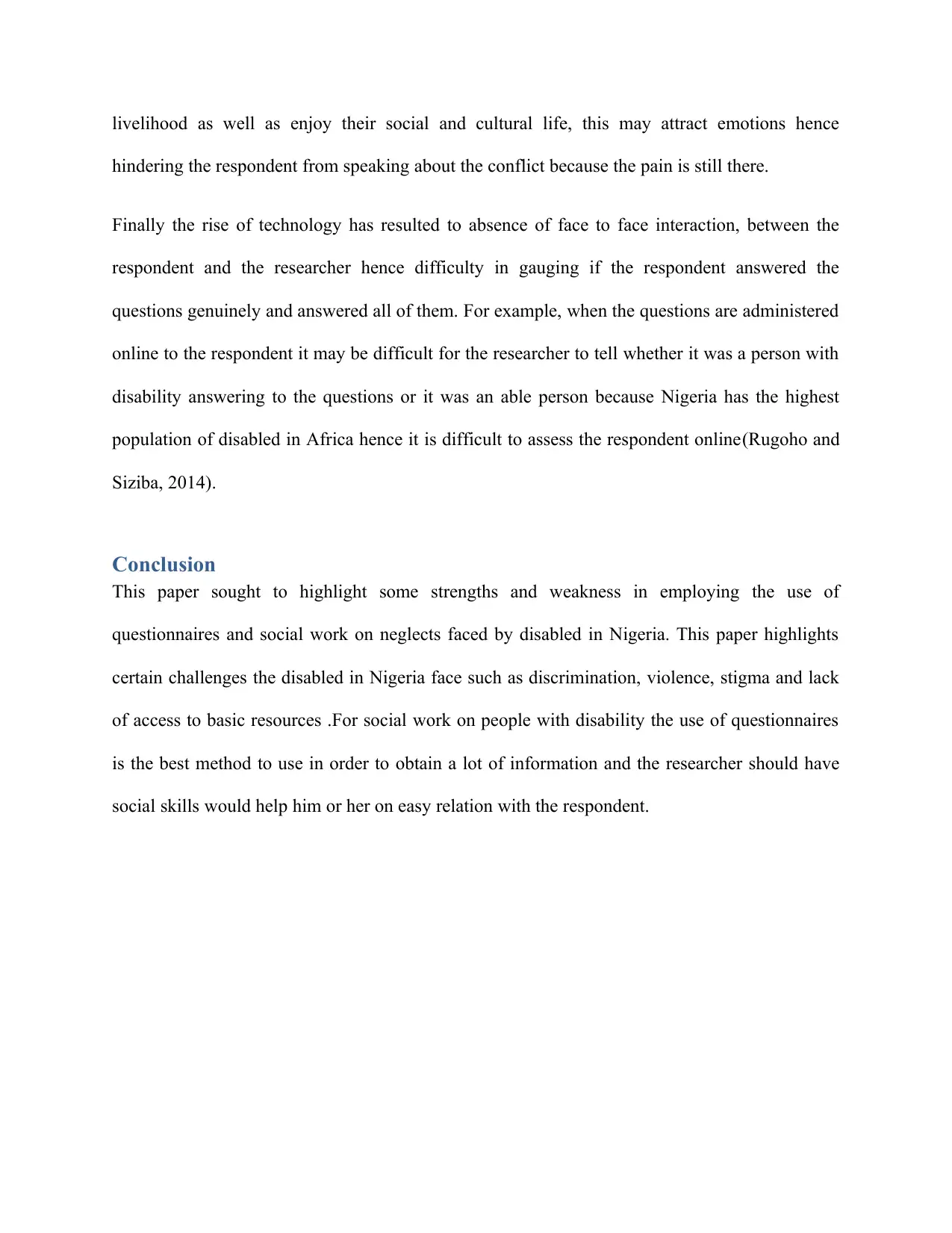
livelihood as well as enjoy their social and cultural life, this may attract emotions hence
hindering the respondent from speaking about the conflict because the pain is still there.
Finally the rise of technology has resulted to absence of face to face interaction, between the
respondent and the researcher hence difficulty in gauging if the respondent answered the
questions genuinely and answered all of them. For example, when the questions are administered
online to the respondent it may be difficult for the researcher to tell whether it was a person with
disability answering to the questions or it was an able person because Nigeria has the highest
population of disabled in Africa hence it is difficult to assess the respondent online(Rugoho and
Siziba, 2014).
Conclusion
This paper sought to highlight some strengths and weakness in employing the use of
questionnaires and social work on neglects faced by disabled in Nigeria. This paper highlights
certain challenges the disabled in Nigeria face such as discrimination, violence, stigma and lack
of access to basic resources .For social work on people with disability the use of questionnaires
is the best method to use in order to obtain a lot of information and the researcher should have
social skills would help him or her on easy relation with the respondent.
hindering the respondent from speaking about the conflict because the pain is still there.
Finally the rise of technology has resulted to absence of face to face interaction, between the
respondent and the researcher hence difficulty in gauging if the respondent answered the
questions genuinely and answered all of them. For example, when the questions are administered
online to the respondent it may be difficult for the researcher to tell whether it was a person with
disability answering to the questions or it was an able person because Nigeria has the highest
population of disabled in Africa hence it is difficult to assess the respondent online(Rugoho and
Siziba, 2014).
Conclusion
This paper sought to highlight some strengths and weakness in employing the use of
questionnaires and social work on neglects faced by disabled in Nigeria. This paper highlights
certain challenges the disabled in Nigeria face such as discrimination, violence, stigma and lack
of access to basic resources .For social work on people with disability the use of questionnaires
is the best method to use in order to obtain a lot of information and the researcher should have
social skills would help him or her on easy relation with the respondent.
Paraphrase This Document
Need a fresh take? Get an instant paraphrase of this document with our AI Paraphraser
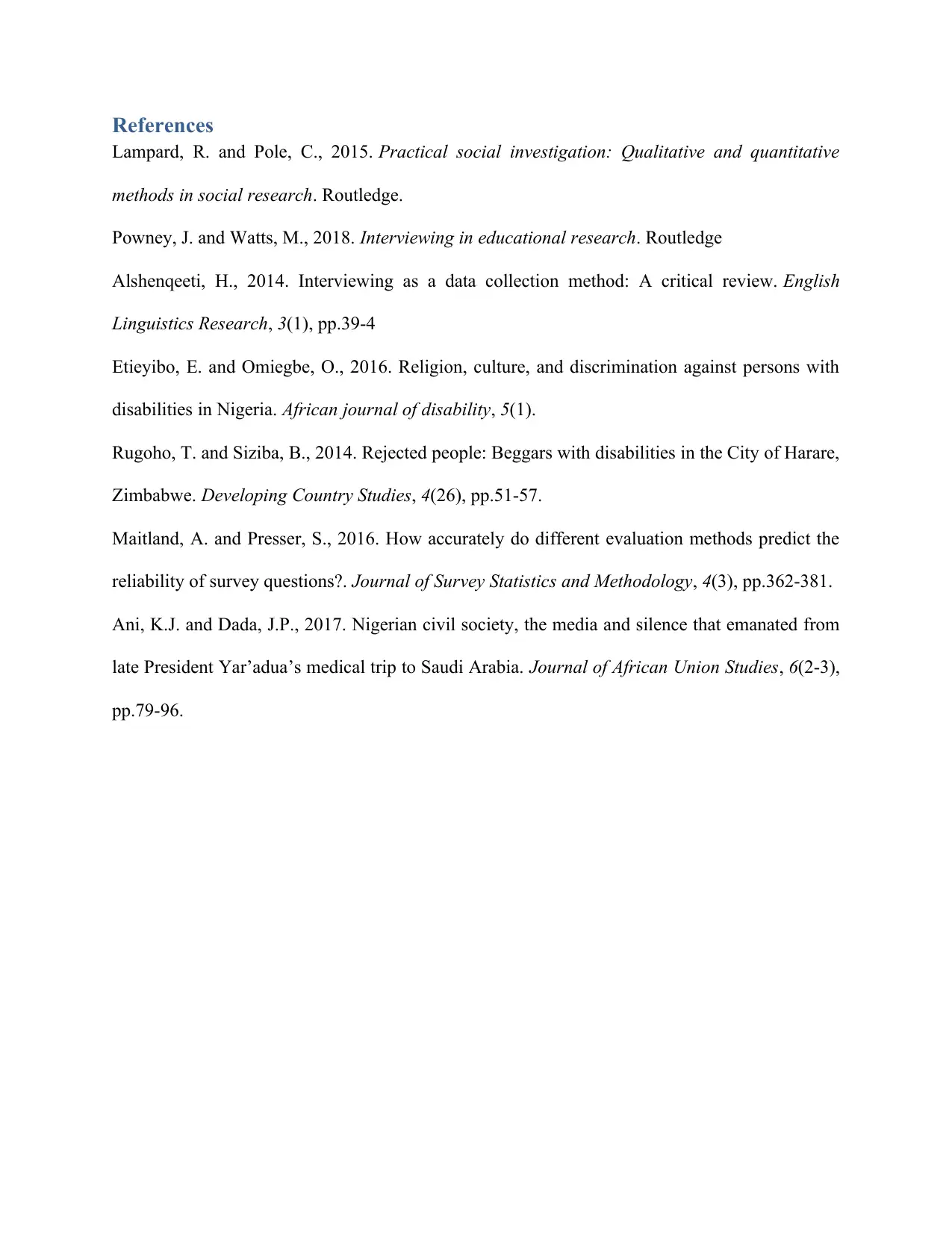
References
Lampard, R. and Pole, C., 2015. Practical social investigation: Qualitative and quantitative
methods in social research. Routledge.
Powney, J. and Watts, M., 2018. Interviewing in educational research. Routledge
Alshenqeeti, H., 2014. Interviewing as a data collection method: A critical review. English
Linguistics Research, 3(1), pp.39-4
Etieyibo, E. and Omiegbe, O., 2016. Religion, culture, and discrimination against persons with
disabilities in Nigeria. African journal of disability, 5(1).
Rugoho, T. and Siziba, B., 2014. Rejected people: Beggars with disabilities in the City of Harare,
Zimbabwe. Developing Country Studies, 4(26), pp.51-57.
Maitland, A. and Presser, S., 2016. How accurately do different evaluation methods predict the
reliability of survey questions?. Journal of Survey Statistics and Methodology, 4(3), pp.362-381.
Ani, K.J. and Dada, J.P., 2017. Nigerian civil society, the media and silence that emanated from
late President Yar’adua’s medical trip to Saudi Arabia. Journal of African Union Studies, 6(2-3),
pp.79-96.
Lampard, R. and Pole, C., 2015. Practical social investigation: Qualitative and quantitative
methods in social research. Routledge.
Powney, J. and Watts, M., 2018. Interviewing in educational research. Routledge
Alshenqeeti, H., 2014. Interviewing as a data collection method: A critical review. English
Linguistics Research, 3(1), pp.39-4
Etieyibo, E. and Omiegbe, O., 2016. Religion, culture, and discrimination against persons with
disabilities in Nigeria. African journal of disability, 5(1).
Rugoho, T. and Siziba, B., 2014. Rejected people: Beggars with disabilities in the City of Harare,
Zimbabwe. Developing Country Studies, 4(26), pp.51-57.
Maitland, A. and Presser, S., 2016. How accurately do different evaluation methods predict the
reliability of survey questions?. Journal of Survey Statistics and Methodology, 4(3), pp.362-381.
Ani, K.J. and Dada, J.P., 2017. Nigerian civil society, the media and silence that emanated from
late President Yar’adua’s medical trip to Saudi Arabia. Journal of African Union Studies, 6(2-3),
pp.79-96.
1 out of 5
Related Documents
Your All-in-One AI-Powered Toolkit for Academic Success.
+13062052269
info@desklib.com
Available 24*7 on WhatsApp / Email
![[object Object]](/_next/static/media/star-bottom.7253800d.svg)
Unlock your academic potential
Copyright © 2020–2026 A2Z Services. All Rights Reserved. Developed and managed by ZUCOL.





